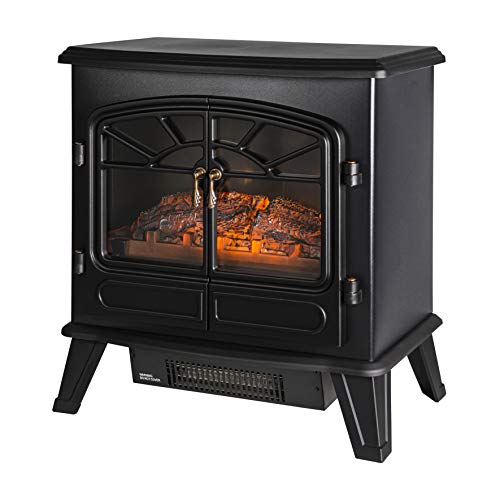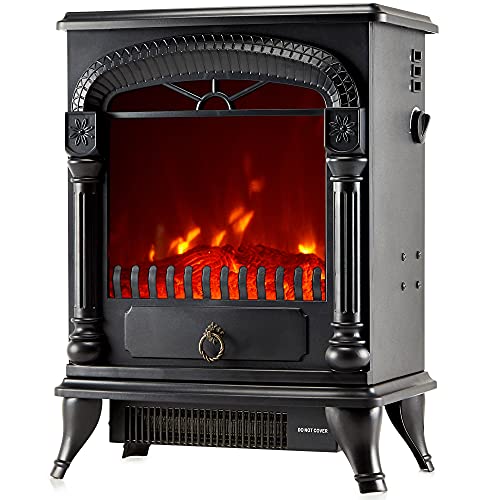Why All The Fuss About Stoves Electric?
페이지 정보

본문
 Why Stoves Electric Are the Green Choice
Why Stoves Electric Are the Green ChoiceOne Brooklyn co-op has recently replaced its 49 gas stoves with electric ones, including both radiant and induction models. The switch will save money for the co-op and will eliminate expensive gas line repairs, inspections, and Local Law 97 requirements.
Electric stoves don't emit harmful carbon dioxide or harmful emissions, unlike gas stoves. The energy to power your electric stove comes from renewable sources like wind or solar.
They are safer
Many homeowners were hesitant to change their gas stoves to electric stoves in the past. This fear is a result of the hysteria created by pundits and politicians who claimed that bureaucrats from the government were planning to take gas stoves off their walls. Electricity offers many advantages over gas. This includes a sleeker appearance and a lower cost initially. They are also easier to clean and more energy efficient.
According to consumer reports, gas stoves release pollutants that can be detrimental to health. These pollutants can cause irritation to the airways and trigger asthma especially in children. These emissions contribute to the pollution of outdoor areas and greenhouse gases. This has led to increasing concerns regarding the dangers of gas stoves, and some cities are limiting their use in new construction homes. In the end, more people are choosing to install electric stoves in their homes.
Gas stoves can be more expensive to run than electric stoves since they require gas piping and are not as energy efficient. In addition, they are vulnerable to breakdowns and require regular maintenance. portable electric fireplace heaters stoves, on other hand, are more durable and energy efficient. They can also be used in power outages and provide more precise temperature control. They are also less difficult to clean than gas stoves as they do not have grates that could get clogged with food particles.
It is up to each homeowner to choose the Best Electric Stove Heater stove to use at home. Regardless of which one they select, it is important to remember that the most popular option is an electric stove. The decision should be made according to the individual's personal preferences and home configuration.
There are three kinds of electric stoves: coil-top glass-top and induction. The first two are identical in that they use 120 Volts of electricity to power the burners. However, induction stoves are different from conventional electric stoves because they use magnetic technology to heat the cookware instead of metal coils. Although they are more energy efficient than coil stoves, induction stoves have higher prices.
They are more efficient
Switching from a gas stove to an electric log burners stove can bring many advantages, including increased efficiency. The initial cost is higher, but electric effect wood burners stoves will save money over time due to their lower operating costs. They also have a lower carbon footprint. This makes them a good option for green homes.
The way electric stoves make use of energy is also more sustainable than gas stoves. Electric stoves use electricity generated by renewable sources, such as solar or wind power, while gas stoves use natural gas which can be extracted through the process of fracking. In addition electric stoves do not emit any of the byproducts of combustion that a gas stove does.
While the click, hiss and glow of a blue flame are appealing to cooks of all kinds however, the truth is that it comes with hidden costs for both humans and the environment. Numerous studies have shown that natural gas stoves are harmful to the human body and the environment. Luckily, top tier chefs like Tu David Phu are switching to electric stoves and urging others to follow suit.
The energy generated by the gas stove is responsible for the heat-trapping emissions which cause climate change. The reason for this is that natural gas has to be extracted from the earth, and methane is released into the air during this process. Methane leaks are also common at every stage of the supply chain, from production to delivery.
When you use a gas stove to cook, the chemical products of combustion from natural gas are released into the air. These fine particles and gases can trigger asthma symptoms in children. These substances are irritating and can increase asthma symptoms, particularly for children. Additionally, the burning of gas creates nitrogen oxide, which causes respiratory problems and can be harmful if breathed in.
electric log burners stoves, on the contrary they do not release these chemicals into the atmosphere. While the electricity that powers electric stoves can be sourced from coal, advancements in solar and wind energy have made this a more sustainable choice. A new generation of electric stoves is so efficient they not only reduce household costs, but also reduce your carbon footprint.
They are more affordable
Generally speaking, electric stoves are cheaper than gas ones. Electric stoves are more affordable initially and have lower running costs thanks to their advanced technology. Furthermore they can be used in the event of a power failure. They are also much safer to use as they operate with heated coils or burners instead of open flames. This is particularly beneficial in households with children who might be enticed to fiddle with knobs and put their hands in hot areas.
Another advantage of electric stoves is that it's simpler to clean. Instead of multiple grates, they have one smooth surface that is easy to clean. Plus the heat is measured on a dial, making it easier to determine what temperature you're cooking. This could be a drawback as it may take some time to adjust to the amount of heat.
Gas stoves can also emit pollutants that could be harmful to people's health. Although the gas industry argues that these emissions are safe but federal agencies are looking into more stringent regulations that could lessen their impact on indoor air quality and climate change. These changes could lead to the eventual banning of gas stoves.
There's also the fact that gas stoves require a gas line in order to operate, which a lot of homeowners don't have. While it is possible to put in a new gas line however, it is costly and time-consuming. In contrast, electric stoves just require a power outlet which the majority of homes already have. They are a great choice for older homes or those with a smaller budget.
Furthermore, many are qualified for rebates on energy-efficient electric appliances, like stoves. This program is part of IRA's High-Efficiency Electric Home Rebate. It has not yet been officially launched, but it will be accessible in the majority of states by the end of the year. These rebates will make switching to an electric cooktop a more affordable option for a large number of people. Electric stoves are also less expensive in the long term than gas stoves and can help reduce energy costs.
They are environmentally friendly
Electric stoves are the most efficient way to reduce carbon emissions. Gas stoves release dangerous toxins like carbon monoxide, benzene, and nitrogen dioxide, which are linked to health issues like dizziness, headaches, confusion, nausea and breathing problems. Moreover, they can also cause indoor air pollution which has been found to be a factor in an increased incidence of asthma in children.
These issues are causing gas stoves to be replaced by more efficient electric cooktops. Not only are electric log burners ranges less expensive to run than gas stoves however, they're environmentally friendly too. Unlike gas stoves, which rely on natural gas, electric stoves can be powered by renewable electricity sources. This makes them an eco-friendly choice for any household.
 Another benefit of an electric stove is its safety. Since they don't use an open flame, they are safer than gas stoves, and don't generate as much smoke. They can also cook larger items such as stockpots, quicker and more evenly than gas stoves. Additionally, the coils of an electric stove cool off faster than those on a gas stove. This means that pots and pans will not ignite which is crucial for households with children or elderly people.
Another benefit of an electric stove is its safety. Since they don't use an open flame, they are safer than gas stoves, and don't generate as much smoke. They can also cook larger items such as stockpots, quicker and more evenly than gas stoves. Additionally, the coils of an electric stove cool off faster than those on a gas stove. This means that pots and pans will not ignite which is crucial for households with children or elderly people.The primary reason to switch to an electric stove is that it's environmentally friendly. Although it's true that the energy that powers an electric stove comes from fossil fuels, this isn't as harmful as it may sound. In fact, it is a far less harmful form of energy than oil or coal. In addition, you can obtain the power to run your stove with solar or wind power and both are renewable sources of energy.
While the government doesn't have any regulations on the indoor air pollution emitted by gas stoves, a lot of cities are banning gas hookups in new construction. The government is also offering billions of dollars in rebates to encourage customers to switch to electric stoves. These incentives, combined with the latest green technology make electric stoves are becoming more affordable and well-known than ever before.
- 이전글What Double Glazing Windows Leeds Experts Would Like You To Be Educated 25.01.08
- 다음글20 Reasons To Believe Property Boarding Up Cannot Be Forgotten 25.01.08
댓글목록
등록된 댓글이 없습니다.
